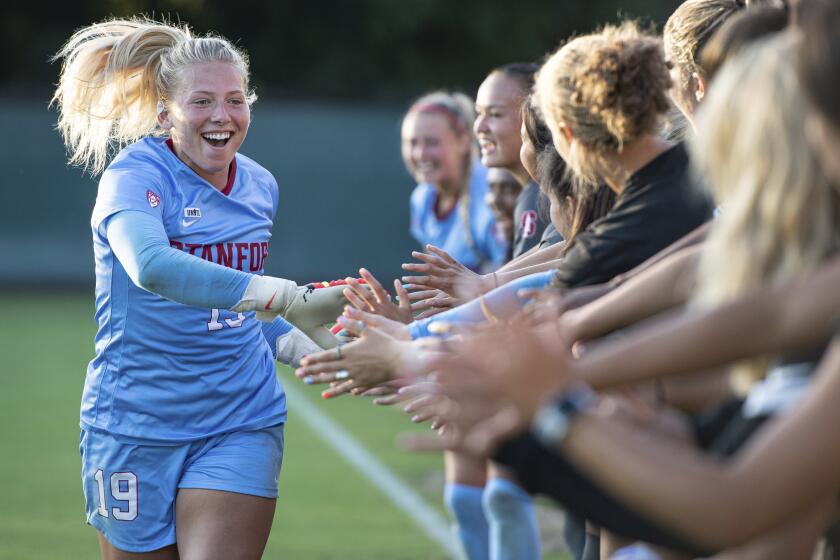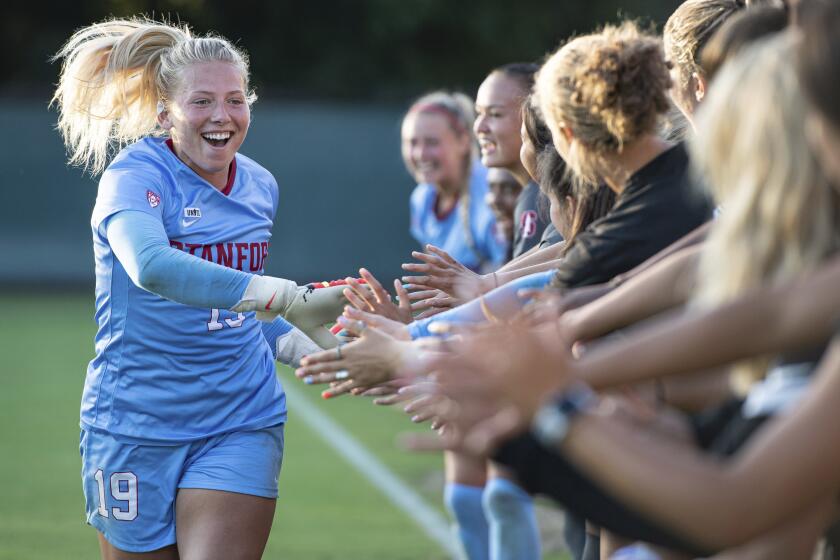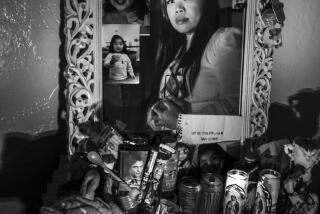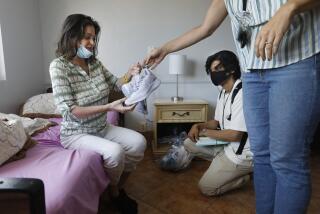After soccer star Katie Meyer’s death, Stanford vows to bolster mental health services

- Share via
A week after Stanford soccer captain Katie Meyer died by suicide, university officials have vowed to bring on additional mental health services.
The March 1 death of Meyer, 22, sent shockwaves through the community, as did the tragic deaths of three other students during the past year: Dylan Simmons, Jacob Meisel and Rose Wong.
Meisel and Wong died by suicide, the San Francisco Chronicle reported.
“Over the last year, the Stanford community has grieved the unimaginable loss of multiple members of our student family, and the past few weeks have been especially challenging and heartbreaking,” the university said in a statement posted to Facebook on Tuesday.
Meyer, 22, was a senior majoring in international relations and was team captain and goalkeeper on the Stanford women’s soccer team.
In response, the university said it has begun recruiting for additional clinical counseling and therapy positions. And officials said the student affairs office plans to tap experts to brainstorm measures beyond clinical support. Over the last two years, Stanford increased its clinical staff by 20%, which officials said reduced wait times for those seeking services.
The move comes as students increasingly seek therapy and other wellness services on campus — a trend that saw a sharp rise during the pandemic. And there’s evidence suicide attempts are increasing among young people. Meanwhile, colleges and universities are struggling to keep up with demand because of a shortage in mental health clinicians, California Healthline reports.
“Mental health remains not only an ongoing challenge but our most urgent priority,” wrote Dee Mostofi, a spokesperson for the university, in an email.
Stanford officials said recent losses “can feel especially overwhelming” amid the ongoing pandemic and outbreak of war in Ukraine, and urged those struggling emotionally to reach out for help.
“For all in our community who are suffering, know that whatever feelings are arising in you are normal and need time to be felt,” officials added. “There’s no one way or right way to grieve, and we are here to support each other as we find our own paths to healing.”
In its statement, the university included an image of the “Angel of Grief,” a statue on the Stanford campus that depicts an angel hunched over in tears.
University officials said they were seeking permanent mental health staffers for its athletics department, and for the school’s counseling and psychological services.
As captain and goalkeeper, Meyer helped lead the Stanford women’s soccer team to an NCAA championship in 2019. Her penalty kick saves were among the most memorable moments of the championship game against North Carolina. She was a senior majoring in international relations and a resident assistant at the time of her death.
Meyer, a senior majoring in international relations, was found dead in an on-campus residence on Tuesday night, university officials said.
Meyer’s parents said they believed she may have received an email regarding a disciplinary action. In a recent emotional interview on NBC’s “Today,” Katie’s father, Steve Meyer, said she had been “defending a teammate on campus over an incident.”
Her parents also expressed concern that, between school and sports, there was too much pressure on their daughter.
A memorial service for Meyer will be held Saturday, university officials said.
In January, Dylan Simmons, a third-year law student set to graduate this spring, died at an on-campus residence.
In February 2021, the university announced the death of medical student Rose Wong, also on campus.
Jacob Meisel, 23, died in August. He was pursuing degrees in electrical engineering.
Mosofi, the Stanford spokesperson, said the pandemic has heightened mental distress, which the university has already sought to address.
“We have responded by expanding resources available to all students, and specific student communities, including varsity athletes, students across all gender and sexual identities, students in various ethnic, racial and religious communities, and students of specific disciplines such as medicine and law,” Mostofi said in an email.
If you or someone you know is exhibiting warning signs of suicide, seek help by calling the National Suicide Prevention Lifeline at (800) 273-TALK (8255).
Times staff writers Brittny Mejia and Hayley Smith contributed to this report.
More to Read
Sign up for Essential California
The most important California stories and recommendations in your inbox every morning.
You may occasionally receive promotional content from the Los Angeles Times.













